The CEO Pulse: Hiring Resource Center
Hiring continues to be a major concern for CEOs in 2024
Our research has shown that hiring is one of the major decisions that CEOs face every year. The economic environment changes. Demand changes. However, people are the foundation of small and midsize businesses’ ability to meet customer demand and scale for the future. This CEO Pulse provides a collection of insights around the topic of hiring, which brings together both expert and peer perspectives to help you navigate decisions around this important topic.
The process of finding qualified personnel has always been a challenge for businesses. However, the post-pandemic labor market has brought new challenges as employers use various criteria to differentiate themselves, including the type of work, compensation, development opportunities, and workplace environment. According to our latest research, almost 50% of small and midsize businesses cannot operate at full capacity due to a shortage of skilled workers, and 56% plan on expanding their workforce in the next 12 months. The Vistage Research team has updated their findings, and you can find the latest information on the big-picture implications for hiring as of February 2024.
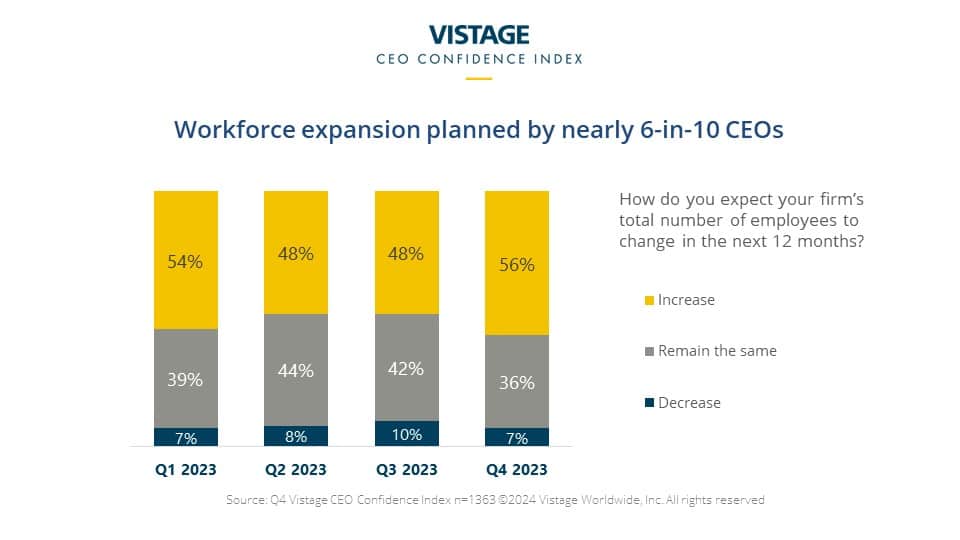
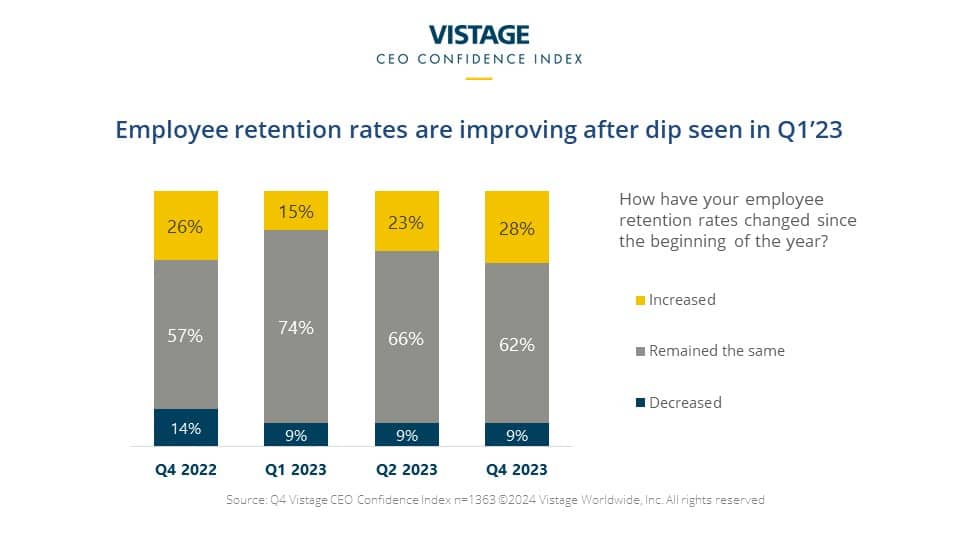
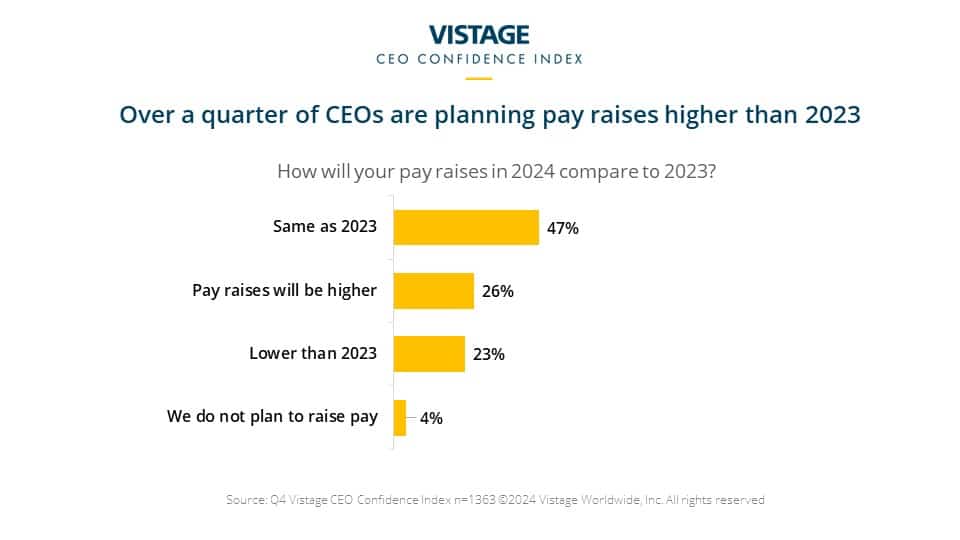
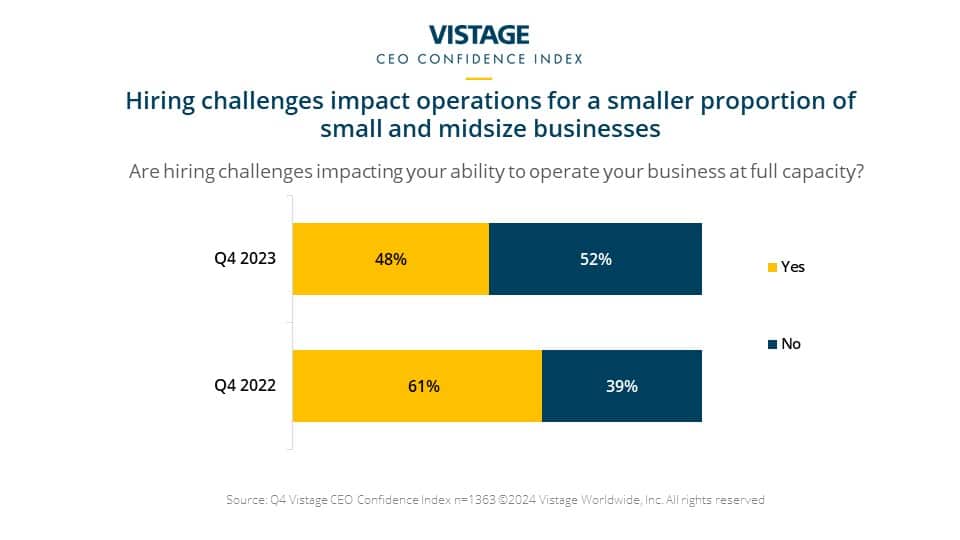
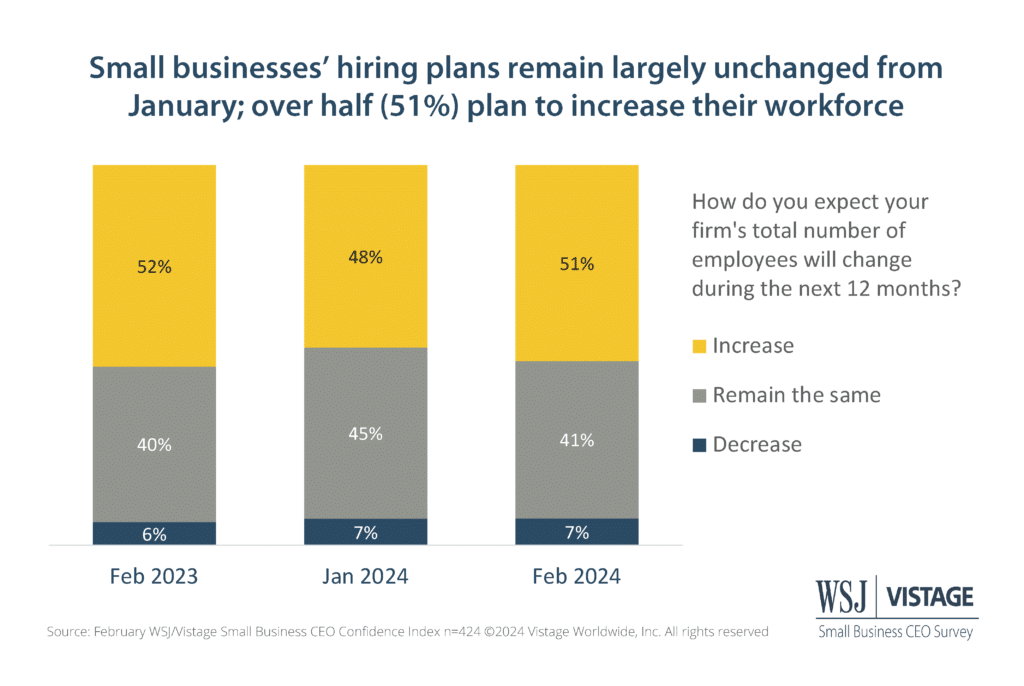
To help with decision-making, we have curated:
- Insights on hiring from trusted experts
- Real-life approaches to hiring from CEO peers
- Join discussions about hiring in Vistage Networks
- Third-party resources on hiring
Insights on hiring from trusted resources
Research
Managing Workforce Velocity: Improving Employee Retention
To help CEOs address #retention, our new report from Vistage Research focuses on four recommendations for keeping top talent, the foundation for sustainable, long-term growth. [updated June 5, 2023]
The Hybrid Gap: How to Create the Ideal Work Environment
Is a hybrid workplace the right solution for your business? In this report, Vistage speakers Marc Emmer and Kathleen Quinn Votaw explore how companies can create the ideal work environment for their employees. [updated June 5, 2023]
Webinars
Future-proof talent: What matters to tomorrow’s workforce matters today [on-demand]
Learn what future employees want out of companies and how to position your organization to stand out in the war for talent. [Updated Sept. 22, 2023]
Attracting and retaining talent: Remaining competitive in a new era [on-demand]
Attracting and retaining top talent has become more challenging than ever. Insperity’s Sheryl LaPlace looks at the key insights your business needs to win the race for talent. [Updated Jan. 20, 2023]
Wage and Compensation: Member Roundtable [Member Exclusive webinar on-demand]
Learn best practices from three Vistage members to guide your approach to wages and compensation so you can keep your employees satisfied while retaining top talent. [Updated Jan. 20, 2023]
Recruiting and retention in the workforce revolution [on-demand]
Dealing with recruiting and #retention issues? HireBetter Managing Director Amy Ancira shares new best practices for attracting, hiring and retaining game-changing talent. [Updated Nov. 4, 2022]
Member roundtable on leveraging assessments [on-demand]
In this roundtable discussion, three Vistage members share how they’ve utilized assessments to support their employee lifecycle — starting with hiring — and the benefits they’ve uncovered. [Updated Oct. 28, 2022]
Member roundtable on hiring best practices [on-demand]
Hiring challenges still hamper CEOs’ ability to operate at full capacity. A trio of Vistage CEO members share new hiring strategies they have found successful. [Updated Aug. 15, 2022]
The CEO’s Journey: People & Culture [Requires My Vistage password; on-demand]
Learn from targeted breakout sessions on how to leverage heart-based hiring, how culture is a big part of talent strategy, and using culture to drive results. You can also watch insights from keynote speakers Erica Dhawan and Liz Wiseman.
David Friedman: How to leverage your culture as a strategic competitive advantage [on-demand]
Top-performing organizations don’t leave culture up to chance. 2021 Vistage Speaker of the Year David Friedman examines what it takes to build and sustain a high-performing culture.
Chair roundtable: Hiring practices for small and midsize businesses [on-demand]
A roundtable of Vistage Chairs examines how some member companies are solving their hiring and retention challenges.
Expert roundtable: Best practices for hiring and retaining hourly workers [on-demand]
A roundtable of Vistage speakers shares their insights on hiring and retaining from this highly volatile portion of the workforce.
Why hiring is personal for CEOs and founders [on-demand]
If you’re struggling with hiring, your purpose and culture might be the issue. Learn how to become the kind of CEO people want to follow.
Establish a learning culture as a competitive advantage [on-demand]
In this latest webinar from Insperity, find out how to implement a learning culture and employee development planning to drive successful hiring and retention.
The impact of implicit bias in the hiring process [on-demand]
Insperity presenter Aisha Thompkins discusses implicit bias, how it occurs, and strategies for reducing it in the hiring process.
Articles from the Vistage Research Center
Winning the talent war in any climate
Attracting and retaining top talent is a significant challenge that all leaders face. Learn tips on how to win the talent war in any climate
6 steps to an ideal employee experience
Engaging employees is not enough in today’s work environment. Talent specialist Kathleen Quinn Votaw shares 6 tips that can help CEOs create the ideal experience for employees.
How 3 CEOs use wages and compensation to drive retention
Recapping our most recent member roundtable (password required), a trio of CEOs shares their unique strategies for adjusting wages, benefits and other forms of compensation to hire and retain top talent.
The State of Employment and Wages
Vistage speaker and strategy expert Marc Emmer explores the key force driving today’s workforce, from hybrid and remote working to employee satisfaction to spiraling wage pressures.
Framework for hiring: What’s a dealbreaker when hiring ‘The Ideal Team Player’?
Best-selling author Patrick Lencioni breaks down the three traits needed in an “Ideal Team Player” and why missing one is a dealbreaker.
Indra Nooyi on “The great re-enrollment” [Requires My Vistage password]
In this member-exclusive clip, former PepsiCo CEO and Chairman Indra Nooyi explains why it’s time to stop focusing on”The Great Resignation” and look toward re-enrolling workers with an emphasis on humanity.
How CEOs can beat the great resignation
Despite the “Great Resignation,” several high-performing companies continue to thrive. How? HireBetter Managing Partner Amy Ancira identifies 3 successful leadership strategies.
Wage compensation in the wake of inflation
Everyone is hiring, and CEOs are increasing wages and bonuses to compensate. Vistage speaker and Compensation Consulting Services Managing Partner Rena Somersan explains why wages are rising.
5 fundamentals CEOs need to succeed in today’s workforce revolution
Today, workers determine when, how and where they will work. Joe Galvin explores 5 factors CEOs must consider as they develop their future workforce.
Employee development tops list of how CEOs compete in talent wars [Requires My Vistage password]Securing the right talent is a necessity if CEOs want to grow their revenue expectations. This report delves into the need for employee development to drive retention as well as efforts to compete for new employees.
Real-life approaches to hiring from trusted peers
As we move through the aftermath economy and the likelihood of a recession looms, CEOs brace for an economic downturn. Vistage Chief Research Officer Joe Galvin explains how leaders can use this time to ramp up for the next growth cycle. [Updated Aug. 28, 2023]
The competition for talent continues to intensify. But traditional hiring strategies are no longer effective. To get and keep top talent, you need competitive recruitment and retention plans. And the key to both? Employee development. Learn how two Vistage members leveraged employee development as a competitive advantage.
In survey after survey, members report that finding talent is a top challenge. Discover how two Vistage members took different approaches to hiring that helped their companies and communities.
Join discussions about hiring in Vistage Networks
Have a question? Need a recommendation? Want a referral? Ask your peers in My Vistage Networks or join an existing discussion. [My Vistage password required]
Ask a question
Or join a discussion:
- PTO and benefits benchmarking [Construction Network]
- Compensation packages [Talent Strategies Network]
- Employee engagement KPIs [Talent Strategies Network]
- Workplace and leadership training options? [Entrepreneurs and Small Business Network]
- Sales rep compensation [Marketing and Media Network]
- Job description Sr. VP HR or CRHO [Manufacturing Network]
- Seeking comp database recommendations [Talent Strategies Network]
- Finding new sales rainmakers [Talent Strategies Network]
- Employee engagement [Talent Strategies Network]
**You must be a Vistage member of the Network to view the discussion. It takes less than a minute to join.**
Third-party resources for hiring
9 Trends That Will Shape Work in 2024 and Beyond [Harvard Business Review]
New Leaders, Here’s How to Hire Top Talent [Harvard Business Review]
How to Hire Employees (2024 Guide) [Forbes]
3 Hiring Trends for 2024: AI, Optimism and Online Recruiting [Forbes]
Does Your HR Department Use AI for Hiring? Here’s What You Should Know [Inc.]
Struggling to Hire Workers For Your Small Business? Get Used To It [Inc.]
5 Ways Hiring Outside Your Industry Can Boost Success [Inc.]
2024 US Labor Market Forecast: Hiring to Slow, Unemployment to Rise [SHRM]
Yes, The Talent Shortage Is Real: What You Must Know To Attract And Retain [Forbes]
3 Steps to Onboard A Hire More Efficiently [Inc.]
The ‘Big Stay’: More Workers Are Hunkering Down And Staying in Their Current Jobs [Forbes]
What New Grads Entering the Workforce Really Want From Their Employers [Inc.]
Five Steps Toward Improving Gen-Z Employee Performance: A Primer For Managers [Forbes]
15 Leadership Tips To Boost Both Work-Life Balance And Accountability For Teams [Forbes]
Labor quality crunch hits small biz [LinkedIn]
3 Steps to Onboard a Hire More Efficiently [Inc.]
The Key to Retaining Young Workers? Better Onboarding. [HBR]


